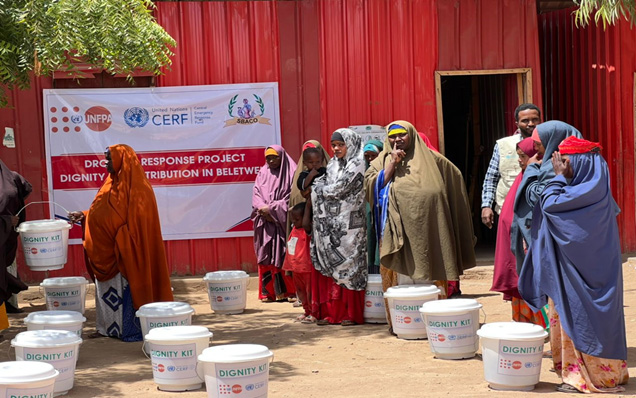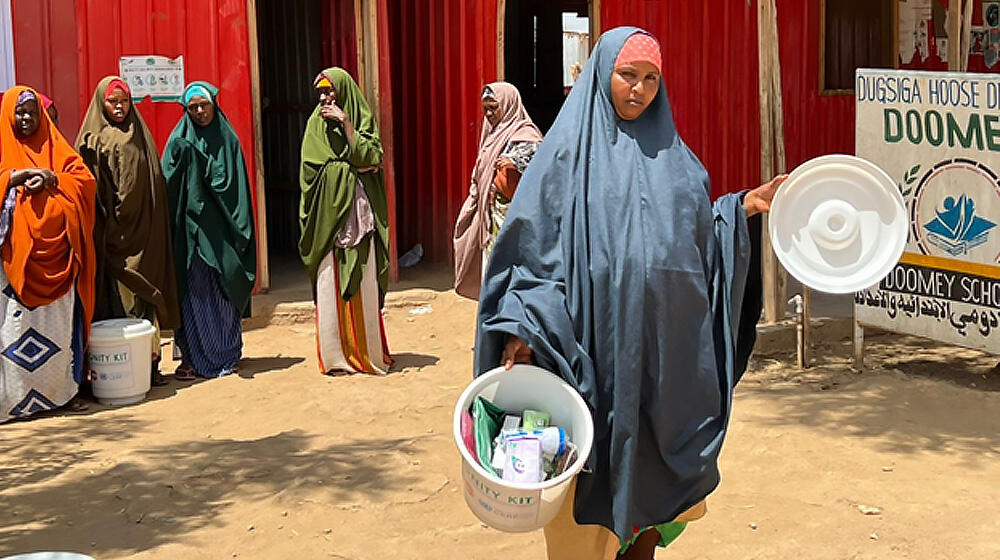Ifrah is a 28-year-old widow and mother of five children who recently fled from her home in the Bulobarde town of Hiran region in Somalia due to the ongoing armed conflict and worsening drought that left her family on the brink of starvation. With no belongings to her name and only her five children to care for, Ifrah found herself seeking refuge at the Doomey camp for internally displaced persons in Beletweyn town.
Somalia has been in the grips of a protracted conflict and drought crisis that has left millions of people displaced and struggling to survive. Women and families have been hit particularly hard, often forced to migrate. Embarking on the grueling trek, with little water or food, often walking for days to reach camps in the hope of finding food and shelter.
Ifrah soon realized that life at the camp was also not easy. The lack of basic necessities such as food, water, and shelter, coupled with the shame and embarrassment of not having proper clothes and hygiene supplies, made her situation even worse. She struggled to maintain her dignity during her menstrual cycle, using old pieces of clothing she found on the ground to hide her shame.
Limited access to basic necessities such as food, water, and shelter further exposes families to disease and malnutrition. The challenges faced by these families, especially women, are endless, from finding safe and secure places to live, finding food and medical support, and struggling to maintain their dignity during menstruation. In the midst of such a crisis, UNFPA partner organizations are working tirelessly to provide aid and support to those most in need, especially women and girls.
When the one of the outreach teams identified Ifrah as a high-priority refugee needing immediate support, she was relieved to receive some pieces of clean clothes for herself and her two daughters, along with a dignity and hygiene kit containing essential supplies for her menstrual health. For Ifrah, these items meant more than just physical comfort and hygiene; they restored her dignity and gave her hope for a better future.
"When I arrived here, I had nothing and no money to buy any basic supplies for myself or children and only wash my clothes at night while I stayed naked as I have no clothes to change the dirty ones. The SBACO team helped me get some extra clothes and this very important kit to hide my shame," Ifrah said.

Two of Ifrah's children needed immediate medical attention – upon receiving support from the mobile outreach team, and free medication; they are now feeling better.
The relief that came from these basic interventions cannot be overstated for Ifrah and many other women like her, who struggle to provide for her family amidst the harsh conditions. Despite the challenges she has faced, Ifrah remains resilient and hopeful for the future, she attributes this hope to the support of organizations like the UNFPA and its partners. She felt that there is still a chance to rebuild her life and provide a better future for her children, if she could get similar support even in the future.
Ifrah's story is one of survival, dignity, and hope in the face of adversity, and it serves as a reminder of the significance of how even the most simplest of support can be the beginning of restoring hope and health, for those who need it the most.


